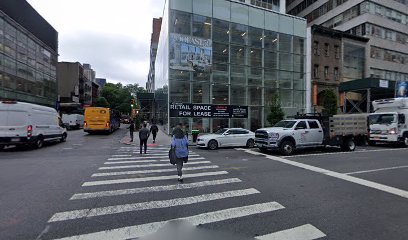The stereotypical picture of a computer programmer— an introverted wunderkind whose first language was Java script,endlessly hunched over a keyboard — doesn’t match the image of a group of coders taking origami breaks, doing yoga and picking a lock as a teambuilding activity, all for the sake of becoming stellar software developers. RELATED:At Fairygodboss, women get real about maternity leave But that’s exactly what developers-in-training do at The Flatiron School, a for-profit school that teaches mobile and web development to New Yorkers of all ages and educational backgrounds. Flatiron’s twelve-week courses are designed for people who aren’t able to commit to a four or even two-year degree program, but who want professional training, stat. The school also offers a Web Development Fellowships for select applicants who need funding. And no, you don’t have to be a computer wiz to get in.
RELATED:The hardest part of the job search isn’t what you think “We don’t look at your GPA or SAT scores, or your work experience. The main thing we look for is passion. Anybody could do it [coding], but it’s hard. It’s a really intense program, but they [students] have to be really committed,” says cofounder Adam Enbar, who launched the company in 2012. Flatiron recently announced new a 22-week fellowship starting in June for foreign-born New Yorkers who are authorized to work in the U.S, in partnership with New York City’s Tech Talent Pipeline initiative. The 36 fellowship recipients must also have no prior professional web or mobile developer experience, and earn less than $50,000 per year. As for activities like origami and breakdancing, it’s all part of Flatiron’s way of getting students comfortable learning and “getting used to being bad at things and moving past things,” says Enbar. An applicant’s train of thought and approach to problem-solving and communication is more important than previous coding experience. Careers 2.0
So far, the existing NYC Web Development Fellowship has helped 130 graduates secure jobs in software development at companies like The New York Times, Kickstarter and Etsy. One of those graduates is Natacha Springer, a former scientist and product manager who earned her master’s degree in Biotech Engineering, but had a hard time finding a job in her field after taking time off to raise her two children. “People really had a negative view of taking a break to raise your kids, especially in the city,” says Springer, who was born in France. “I got a couple offers, but they were at entry level positions. So I figured if I were to re-enter at an entry level position, I might as well so something completely different.” That’s when she decided to apply for a fellowship at Flatiron.
“Every day you have to push yourself, you have to be uncomfortable. If you make a mistake there’s pages and pages of errors the computer spits out at you,” says Springer. “On the other hand, it was one of the best experiences of my life. I didn’t think I could learn so much being later in life, in my late 30s, so that was extremely rewarding.” Springer now works at Kickstarter as a cloud operations engineer. She’s on an 80 percent schedule, which allows her to spend one day a week at home with her kids.
At Flatiron, the idea is that anyone can learn to code —and Enbar believes that in the near future, everyone will probably have to.
Says Enbar, “Realistically, ten years from now, it’s not going to be possible to be a journalist if you can’t visualize data on the web, or to be a marketer if you can’t build a web page. In the same way that reading and writing is a critical part of any job — not just for people who write professionally — technology is becoming a fundamental part of every job, in every industry. Today, knowing how to code gives you an advantage in the workforce no matter what you do. Very soon, it will be a basic requirement.”
Everyone will need to learn how to code

iStock


















